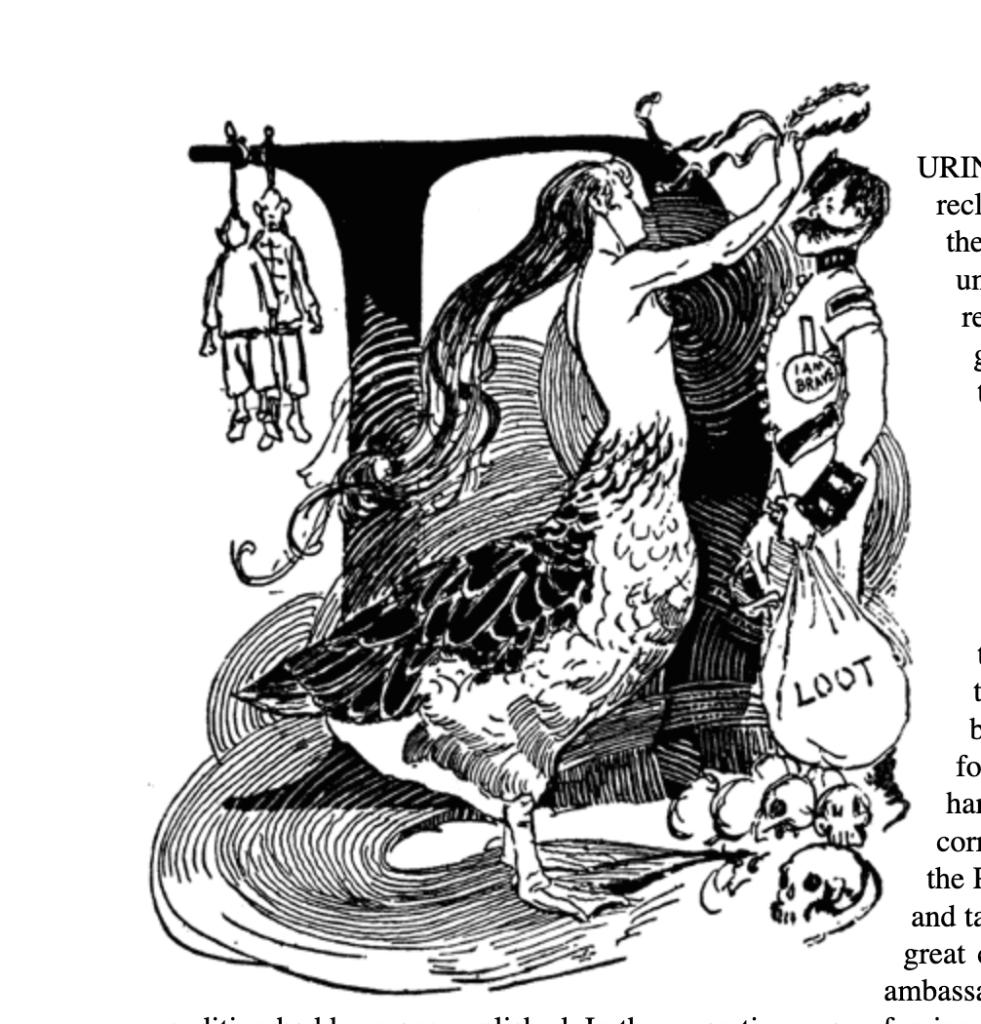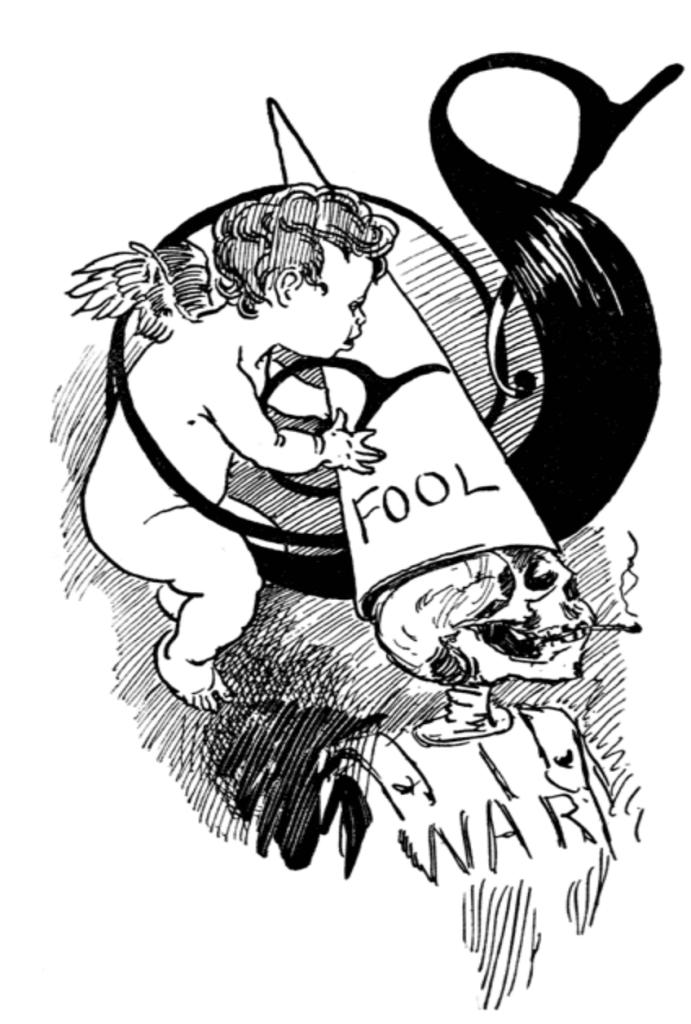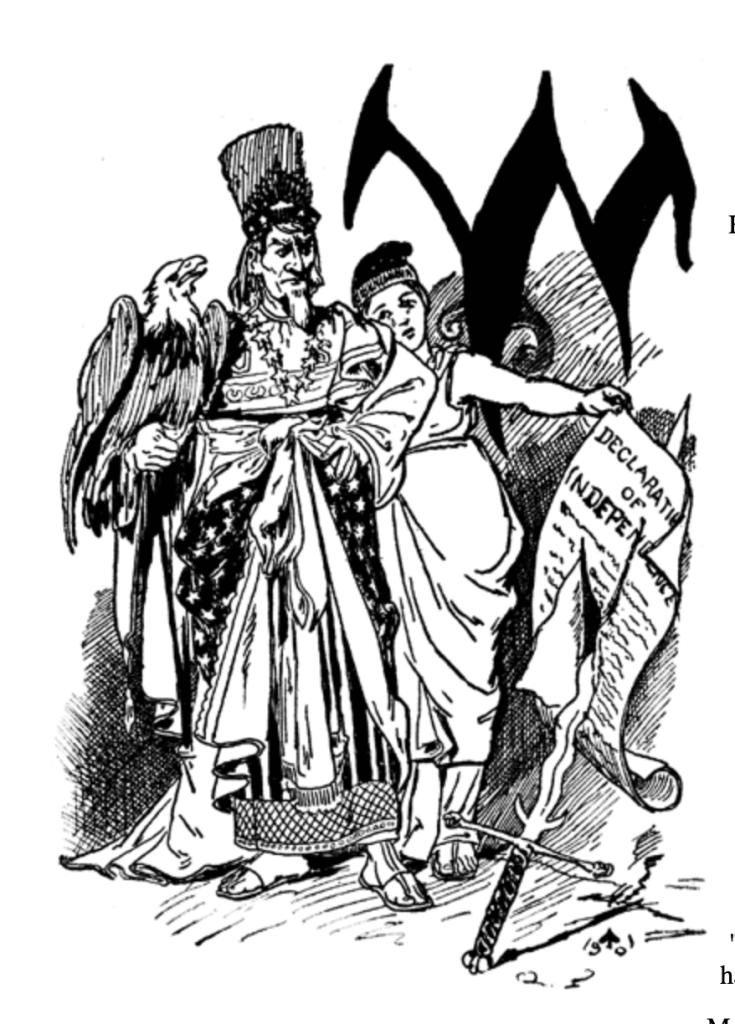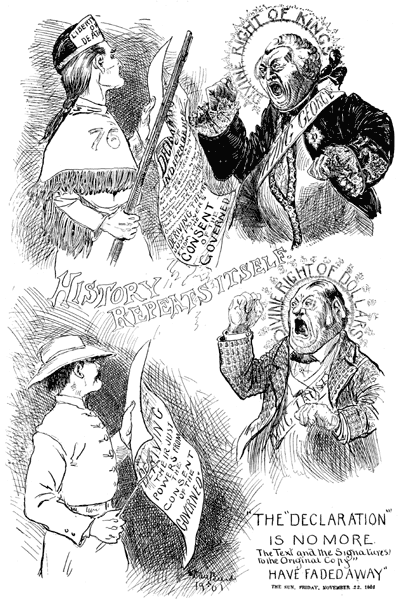I have been discussing Ernest Crosby’s novel Captain Jinks, Hero (1902), which I would claim as a lost classic of radical American literature, a comprehensive assault on war, militarism, empire, institutional religion, and racism. One reason that it is lost, I think, is so much of the message is delivered quite subtly, and you really have to stay awake to catch all the allusions. No, Crosby calling the flag “Old Gory” throughout is not a typo (but try telling Autocorrect that). . You also need a potent sense of the absurd: I have previously noted the analogies to Catch-22.
Here, I will go through a couple of fairly representative and potent passages in what is in fact a lengthy book. There is lots more to discover here, and I am scratching the surface. I would argue that what we have here is a fine overview of American radical attitudes at the start of the twentieth century, and one that often foreshadows better known events of later years. Lord, but it is quotable!
Patriots, Veterans, and Fakes
Just as a case in point, I take the scene where Sam, the noble warrior, returns to the US after his heroic service in the “Cubapines” (Cuba/Philippines), and China, to be greeted by all the patriotic societies that were such an effervescent feature of the US at that very time. And what were these groups?
“Oh, there’s the Grandsons of the Revolution and the Genuine Grandsons of the Revolution, and the Daughters of Revolutionary Camp-Followers and the Genuine Daughters, and then the Male Descendants of Second Cousins of Heroes, and the Genuine Male Descendants, and the Connections by Marriage of Colonial Tax-Collectors, and then the Genuine Connections, and a lot of others I can’t remember.”
SPOILER: Crosby did not have much time for these groups, especially when so much of their attraction was in boasting of White Anglo-Saxon racial purity at a time of non-WASP immigration.
So why are there so many such societies? Well, explains Crosby’s character, they are always fighting amongst themselves, and splitting, and each faction wants to take the name:
“Half of them won’t speak to the other half. But they’re all united on one thing, I can tell you, and that is in wanting to put down the Cubapinos.”
“That they are,” cried Reddy. “That’s why they call ’em ‘Patriotic Societies.’ It was our ancestors as fought for freedom that they made the societies for. Our ancestors were patriotic and fought for freedom once, and now we’re going to be patriotic and stick by the government just like they did.”
“Yes, they fought for freedom, that’s true. And what are the Cubapinos fighting for?” asked the young man.
Gee, what a good question. Were the Cubans and Filipinos not fighting a patriotic revolutionary war, just as much as the Americans of 1776?
Veterans of Future Wars
One other Crosby joke demands respect for its prophetic quality. Among the various groups in procession, we encounter the Ancestors of Future Veterans, a popular catch-all for those desperate people who couldn’t even scare up a tax collector or camp follower from the Revolutionary War era.
A “Future Veterans” movement, what a silly idea! And then we fast forward to 1936, when a couple of Princeton undergraduates created a prank movement called the Veterans of Future Wars, so they could receive all the benefits due to veterans while they were still alive to enjoy it. What began as a joke movement had 60,000 members within a couple of years of its foundation, and it became a major force in anti-war and isolationist activism. I wonder if those student founders got the idea from Crosby?
Ghosts of Wars to Come
A pastor then preaches an inspiring sermon to the assembled patriots:
“We have been told, my friends, by wicked and unpatriotic scoffers, that these wars have stirred up the passions of our people, that there are more lynchings and deeds of violence than ever before, and that Negro soldiers returning from the war have shot down citizens from car-windows. I have even been told that its effect is to be seen in the attempts of worthy citizens, including a distinguished judge, to have the whipping-post reestablished in our midst. I can only say for myself that such traitors and traducers should be the first victims of the whipping-post. (Cheers.)
So far from crime having increased since the departure of these young heroes, I can testify that there has been a marked decrease in our community. Since they left, not a single barn has been burned, not a chicken stolen. My friend, Mrs. Crane, informs me that she keeps more chickens than ever before, and that she has not missed one in over a year. I am also told that during the absence of these young men the amount of liquor drunk in our town has sensibly diminished. The war then has been a blessing to us and to our nation.”
Put another way, the soldiers who went off to fight the Cubapinos were a bunch of the worst drunkards and thieves in the community, which benefited hugely from their absence. And when the veterans came back, there is no way that any respectable person would give them jobs.
I repeat, this kind of rhetoric is very familiar from the 1920s and 1930s, focused on the veterans of the First World War, the “forgotten men”. Not to mention the effect of the war on radicalizing Black soldiers, and the hideous racial conflicts of 1919 through 1921. . And there really is not much here that would not be echoed once again in the Vietnam years. But here it all is, in full flood, in 1902.
From Havilla to Saigon
Let me return to that Vietnam analogy, as that war was portrayed by its critics. Here is Crosby’s portrait of the newly captured colonial capital Havilla (Havana/Manila), which sounds a lot like Saigon c.1968. Our hero Sam asks
“What building is that,” he added, “with our flag over it and the nicely dressed young women in the windows?”
“That?” said Foster, laughing; “oh, that’s the Young Ladies’ Home. We have to license the place. It’s the only way to keep the army in condition. Why, we’ve got about fifty per cent infected now.”
“Really?” cried Sam. “How our poor fellows are called upon to suffer for these ungrateful Cubapinos! Still they can feel that they are suffering for their country, too. That’s a consolation.”
“There’s more consolation than that,” said Foster, “for we’re spreading the thing like wildfire among the natives. We’ll come out ahead.”
“I wish, tho, that they wouldn’t fly Old Gory over the house,” said Sam.
“There was some talk of taking it down, but you see it’s the policy of the Administration never to haul down the flag when it has once been raised. It presents rather a problem, you see.”
Goooooood morning, Vietnam!
So what you have in a few lines of dialogue is a portrait of the sex industry that has sprung up to accommodate the declared mission of “Civilizing and Christianizing” the natives; a jibe at administration rhetoric of never running down the flag over an occupied territory; and a reference to the sexual diseases that aptly symbolize the impact of civilization and empire on conquerors and natives alike. They have spread American Syphilization far and wide.
That is pretty economical! And again, does it not recall Catch-22, where mass organized prostitution is such a major theme, both in the novel, and the subsequent 1970 movie adaptation, by Mike Nichols?
Every line of Captain Jinks, Hero clamors for quotation.

















